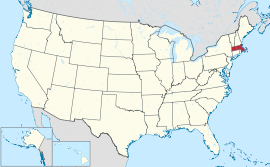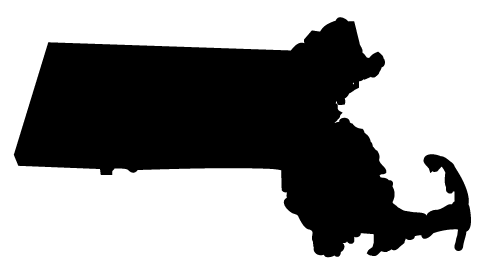 |
| A portion of the north-central Pioneer Valley in Sunderland |
Massachusetts early settlers were responsible for nicknaming the "Bay State" because of its proximity to several large bays. The "Old Colony State" refers to the original Plymouth colony. As for it being referred to as the "Codfish State," the 10-20 pound cod (Gadus morrhua) has been a symbol of Massachusetts for over 200 years - a sculpture of a cod fish hangs in the House of Representatives. The fishing industry provided the Puritans with food, fertilizer, and revenue for trade (native Indians also used cod for food and fertilizer). Today the Atlantic cod is listed as threatened.
One of the thirteen original colonies, Massachusetts became the 6th state to ratify the US Constitution on February 6, 1788. Officially called a commonwealth, Massachusetts holds a unique place in the history books since it marks the landing place of the Mayflower and the Pilgrims. Its name originates from the Massachuset tribe, an Algonquian Indian word that means "a big hill place." Boston, the capital of Massachusetts, was the home of the Boston Massacre and Boston Tea Party during the American Revolution. In addition to its revolutionary spirit, the state is known for sparking the American Industrial Revolution with the growth of textile mills in Lowell, and for its large Irish-American population.
[The thirteen colonies were: Delaware, Pennsylvania, New Jersey, Georgia, Connecticut, Massachusetts Bay, Maryland, South Carolina, New Hampshire, Virginia, New York, North Carolina, and Rhode Island and Providence Plantations]
 |
| Massachusetts is a state in the New England region of the northeastern United States. |
 |
| Massachusetts State Seal |
 |
| Wild Turkey The wild turkey was designated the official Massachusetts state game bird in 1991. A true native American, the eastern wild turkey is the largest and most widely distributed of the six recognized subspecies of wild turkey in North America. Turkey Trivia: ************ The turkey was almost our national bird!If it had been left up to Benjamin Franklin, the Turkey, not the Bald Eagle would have been designated as our national bird. That would include all the "gobbles," "clucks," "putts," "purrs," "yelps," "cutts," "whines," "cackles," and "kee-kees" that go along with it! Wonder what impact that would have had on the traditional Thanksgiving dinner...Um-m-m? |

State Insect: Two-spotted Ladybug
The ladybug was adopted as the official state bug or insect symbol of Massachusetts thanks to a campaign that began in 1974 by a second-grade class in the town of Franklin (The Ladybug Story). Even the little children understand The Spirit of the Ladybug!
Added Plus:
While many of states thus far have a designated state animal,
Massachusetts is the first state to have a state cat.
Meet the Tabby Cat!
The tabby cat (Felis familiaris) was designated the official state cat in 1988,
in response to the wishes of the schoolchildren of Massachusetts.
 |
| The endangered Mayflower (Epigaea regens) - photo © Gale (yeimaya) on Flickr - noncommercial use permitted with attribution / no derivative works
|
The official state song of Massachusetts is “All Hail to Massachusetts,” written by Arthur J. Marsh. It was unofficially adopted in 1966, but it was written into law by the state Legislature in September 1981. The song’s lyrics celebrate the state’s rich history, with the opening lines mentioning key battles in the Revolutionary War, such as Bunker Hill and Lexington and Concord. It also mentions key items that are associated with Massachusetts, such as baked beans, cod, and the Massachusetts Bay, for which the state has been nicknamed the Bay State. Although “All Hail to Massachusetts” is officially listed as the state song, Massachusetts also has adopted its own folk song, “Massachusetts,” by Arlo Guthrie, as well as a number of other songs that have been adopted by the Commonwealth.
Birth of a Cookie
not just any cookie, but THE ultimate cookie!
 |
Homemade chocolate chip cookies - photo © Liza (Kodamakitty) on Flickr -
|
Everybody loves
the chocolate chip cookie
but how many know
the chocolate chip cookie
but how many know
where its first cookie was born?
All the butter, sugar and chips
All the butter, sugar and chips
point in one direction
t'ward the state of Massachusetts
for cookie, folks, not corn
That's the state by the bay
known for its big fish
yet when you talk cookie
that brings on the nod
Melt in your mouth goodness
a mere accident by design
sweeter and much better
than that 10 to 20-pound cod
'Twas the Toll House Inn
which brought out the surprise
which brought out the surprise
Supposedly to be
Lack of one ingredient
substitute of another
left chocolate unmelted
making cookie history









No comments:
Post a Comment